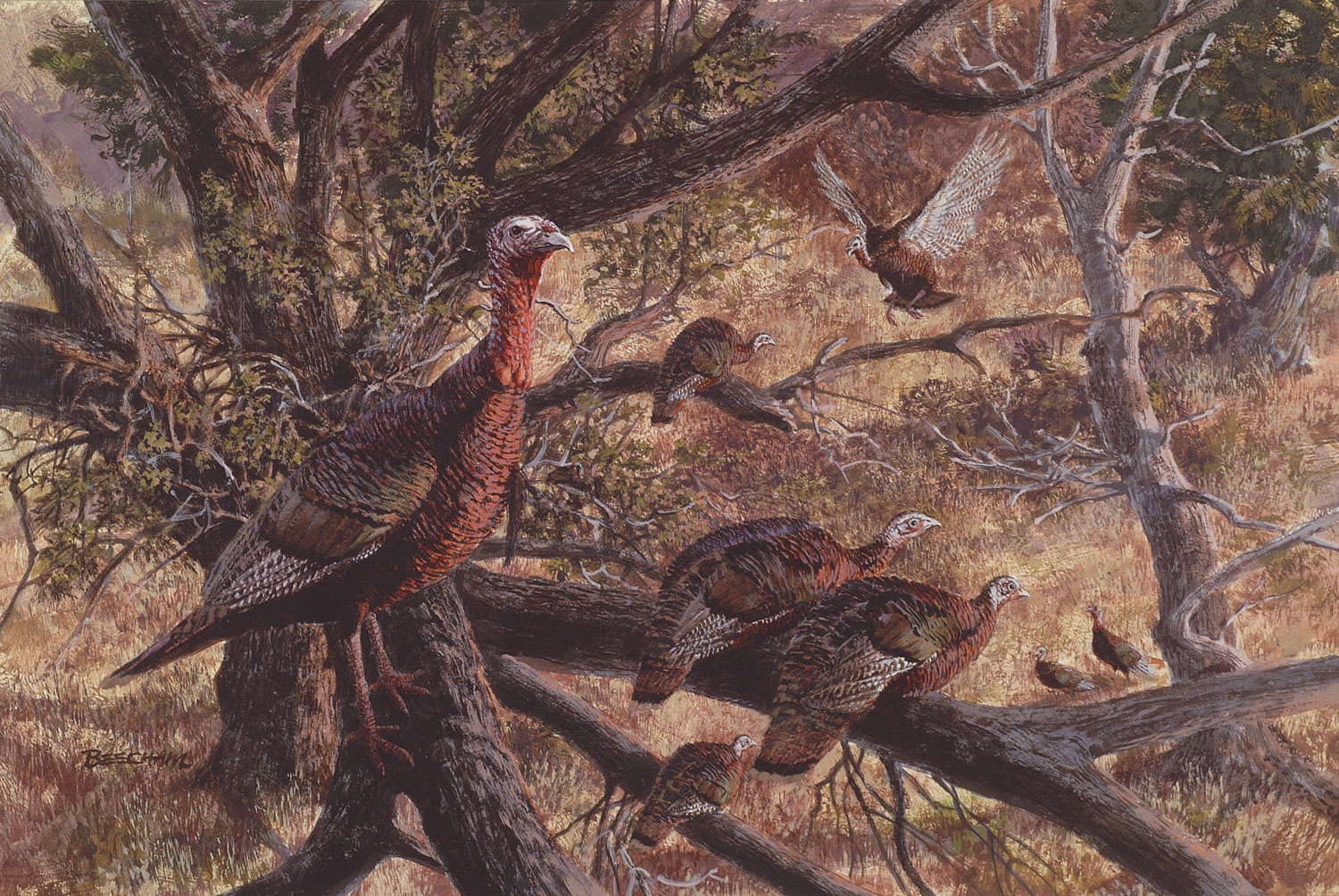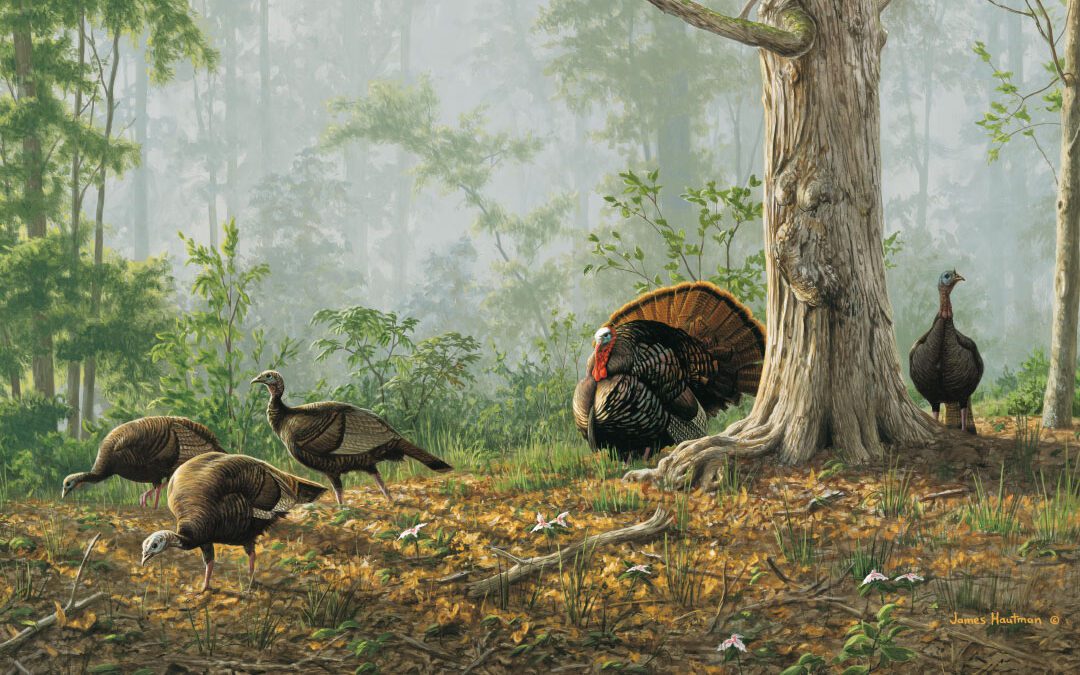May is an odd time to hunt. The woods are luxuriant, the valleys clothed in greens, rivers tumescent. It’s warm. For one used to concealing himself in a bare tree or in a blind made of dead branches sheeted in morning frost, it’s disconcerting. One should be fishing instead, it seems – or prepping the summer gardens.
Only two things are in season – black bear in some parts and, of course, turkey.
Turkey season is a month long, timed to take advantage of the tom’s powerful urge to procreate.
He spends this time puffing himself up in natty display, courting and mating as many hens as he can. In his downtime he metes out devastating punishments, thrashing lesser males into submission. This conduct is not unique in the animal kingdom, but the ferociousness by which it’s played out here can be startling. And it makes an already jumpy bird that much harder to kill.
One likes Vermont for so many reasons. Each season has a splendor its own. It’s impossible to favor one over the other. The place is of memories. There, too, is the sport, deer and grouse in the fall and in winter, skiing. In spring, the streams are full of fishermen, each bend ahead with the promise of trout, or perhaps a covered bridge. It is the spring of cool nights and warm days. Gardens of color. The fields are mowed, the roads muddy and rutted.
The valley where we hunt is full of game, and from its heights one can see the steeple of the church, and silos far off, shimmering in the sun.
Walking in the dark to my place in these woods is an exhilarating thing. You are suddenly aware of how wrong it is that you are there. Screech owls whinnying and trilling, sounds from Grimm. Each step we take on the carpet of dead leaves is deafening. Despite tiptoeing, we are like wild boar crashing ahead of teams of beaters.
I have been exactly here many times and nothing seems is as it was. Familiar rocks have moved, or become larger. Paths have materialized where there were none. Those trodden for years are suddenly overgrown and impassable. It’s as if the place has been rearranged by gremlin landscapers working in the night.
At dusk yesterday, under a green-black sky, we had listened for their calls and marked their roost in some hardwoods high above the valley floor. And today, we want to set up before light, close to that spot, without giving ourselves away. Then with gentle calls we hope to lure them within range. Less is more with everything in life, from writing to flirting, and flirting is exactly what we are doing here.
It’s 5 a.m. and the sky is gray, the stars fading points. As if a silent alarm has gone off, the place comes alive.
A signal corps of woodpeckers strikes up a relay of secret messages up and down the valley, rapping them onto dead and hollow trees as if they are telegraphs. A raven, far overhead, croaks like he does every morning, same time and place in the sky, his appointed rounds scheduled to the rhythms of a world well beyond understanding. And then the turkeys start in.
What a sound this is. No call is so familiar and yet, when heard in the near light of day, deep in the woods, so peculiar, so astonishing, an impressive, imposing call, alternately dreadful and ludicrous – a warning that from down on high comes a libidinous, lumbering giant to stake his claim.
We quickly set up; the light coming too fast. When they step from the trees we want them to come to us. Tim gives a soft cluck on his call and the canopy overhead erupts in ferocious gobbling. They know we are here. We refuse to call again, both irritating and enthralling them. They gobble again, more loudly, more desperately. And then a long spell of quiet.

On The Roost By Tom Beecham – Courtesy The Remington Collection.
Curiosity triumphs and out of huge oaks they come, like paratroopers. There are four, all jakes, and on cupped wings they drop in not more than 25 yards from us. On the ground they fan out, now ungainly guerillas on the sneak. They are uneasy and they stop coming forward. But they don’t stop gobbling. It’s thunderous now. We swear later that we could feel the percussive blasts and the lingering, reedy vibrations deep within their throats.
All of this doesn’t dampen our nerves. Instead, we’re jangled. There are turkeys all around us, the light becoming yellow from gray over the tops of the mountains to the east. Legal shooting.
Now is the moment that comes during a hunt when the decision to shoot is looming. We have done this all right. Here he is, not 15 yards away, gloomy, a Pierrot of the wood. There is enough brush between us to cover my movement if I mount and shoot. I think so anyway. Yet, these are our first birds. We have three days ahead of us, and the woods are filled with gobbling. Do I shoot now and end this hunt, or wait, with the risk that I never get another chance? I decide not to shoot. It feels unearned to do so, deceitful – a crime committed before there is a reason.
I watch instead. They start in closer again, apparently overcoming any reservations. Their red heads are periscopes peering over low spring saplings. Then they are gone, folding into the understory. Higher on the hill, the sound of water coming over the worn rocks of the stream, of oaks in the breeze.
If I had hoped they would come closer and reveal secrets about themselves, secrets I could use again against them, it matters little now. They are the last birds we see, though we hear later a shot nearby, someone obviously not wrestling similarly with opening day concerns.

Heavy Metal by Jim Kasper
There are more days like this, each warmer than the next. At times the sun rises, it seems, higher and faster, the heat stacking on like planks. We become drowsy, sleeping in our hiding places. Perhaps when I doze, massive toms stride by, tails fanned, chest feathers puffed, wings dragging roughly against the ground, winking at my lack of discipline. At least they do in my dreams.
A deer steps slowly by, lost eventually in a meadow of wildflowers yet to erupt. Robert Penn Warren’s hawks glide overhead, “From plane of light to plane, wings dipping through / geometries . . .”
Gunshots here and there, punctuations of success validated later by the records at the game station in town. And of course, my raven, back and forth, back and forth.
Every day we see less action, as if the birds are casing us instead. Fewer gobbles, and fewer shots. Flies dancing on our faces. We swat at them, giving up more advantage. One day a pair of black-and-white warblers flitting about the twigs above my tree, almost alighting on the muzzle of my gun. Tiny winged zebra.
From down the valley, miles from us, the sounds of the barely prosperous. Chainsaws like wasps. Tractors. Semis towing grain and cattle, surging through gears on the steep grades. The sun is higher again and the stink of manure arrives on the same thermals that carry the hawks.
We have been here two hours and just now the town below us is getting to work. We haven’t seen or heard a turkey in days. I’m losing focus. I’m hot in my woolens and the flies are at it again. Hunting ends at noon, and time is running out.
I think about those first birds, curious, horny fools right in my sights. I begin to regret having passed on them. Only later will a local tell me to never feel sporting about turkeys, they will dupe you more than you will dupe them. Just get one in the bag. But I have to learn this myself, of course. I have to pass on that easy, early bird just to learn that I shouldn’t have.
At noon I stand and shuck the unfired rounds from the magazine and look around the hillside. I will be back in the fall, for the grouse, but already I feel the weight of longing. This is a place I love. I have spent so many days here, and it’s not enough.
As I turn to leave, I see, just yards away, a turkey, his head blood-red, swollen with sex, every bit the metaphor for everything driving his existence. He is beautifully ugly, and ridiculous standing there, as am I, in my camouflage, the both of us caught as if suddenly from the bath and without a towel. He is sentry-still, watching me, glaring really. I wonder, as the woodpeckers pick up their coded drumming again, how long he had been there, knowing all along that I was.
And who is the fool?

